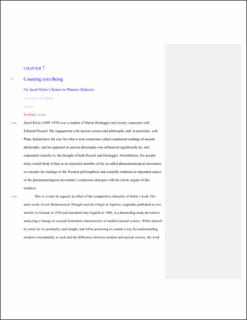| dc.contributor.author | Larsen, Kristian | |
| dc.date.accessioned | 2021-10-21T08:11:15Z | |
| dc.date.available | 2021-10-21T08:11:15Z | |
| dc.date.created | 2021-05-04T13:07:55Z | |
| dc.date.issued | 2021 | |
| dc.identifier.citation | Studies in Contemporary Phenomenology. 2021, 20 202-228. | en_US |
| dc.identifier.issn | 1875-2470 | |
| dc.identifier.uri | https://hdl.handle.net/11250/2824376 | |
| dc.description.abstract | In this chapter, Kristian Larsen tackles Jacob Klein’s philosophical reinterpretation of Platonic dialectic and his diagnosis of modernity as a second Platonic “cave,” alienating us from ourselves and the world. Larsen seeks to circumscribe characteristic features of Klein’s view of the difference between ancient and modern science and philosophy by comparing his understanding of modernity with those of Martin Heidegger and Leo Strauss. The “return to ancient philosophy” associated with Klein and Strauss, Larsen argues, must be seen as critical responses to Heidegger’s “destructive” reading of Greek philosophy. Like Strauss, Klein agrees with Husserl and Heidegger that the modern conception of rationality is deeply flawed and that the twentieth century is a century of crisis revealing fundamental deficiencies in the foundations of modernity. And like Strauss and Heidegger, Klein argues that this crisis calls for a return to the Greek origins of the Western tradition. But in contrast to Heidegger, who came to see this crisis as the culmination of Western metaphysics, Klein argues that it results from a radical transformation in the way concepts are understood. This diagnosis suggests a close connection between Klein and Strauss, a connection that the chapter explores: from their perspective, ancient philosophy offers a vantage point from which we may achieve a perspective on modernity that can help us overcome central prejudices dominating modern mass societies. | en_US |
| dc.language.iso | eng | en_US |
| dc.publisher | Brill | en_US |
| dc.title | Counting (on) Being - On Jacob Klein’s Return to Platonic Dialectic | en_US |
| dc.type | Chapter | en_US |
| dc.description.version | acceptedVersion | en_US |
| dc.source.pagenumber | 202-228 | en_US |
| dc.source.volume | 20 | en_US |
| dc.source.journal | Studies in Contemporary Phenomenology | en_US |
| dc.identifier.doi | 10.1163/9789004446779_009 | |
| dc.identifier.cristin | 1907965 | |
| dc.description.localcode | This is the authors' accepted manuscript to a chapter published by Brill. Locked until 29.4.2022 due to copyright restrictions. | en_US |
| cristin.ispublished | true | |
| cristin.fulltext | postprint | |
| cristin.qualitycode | 1 | |
